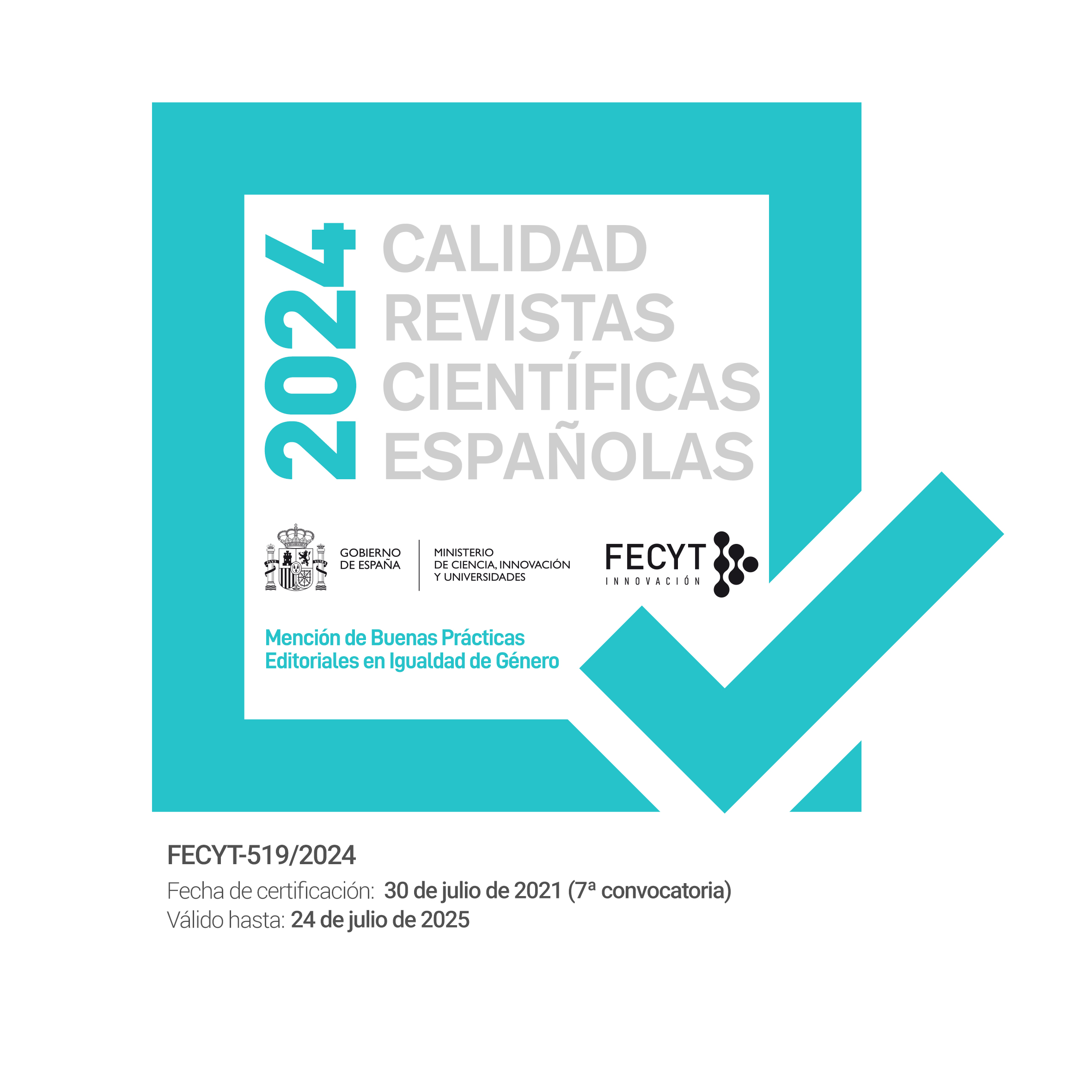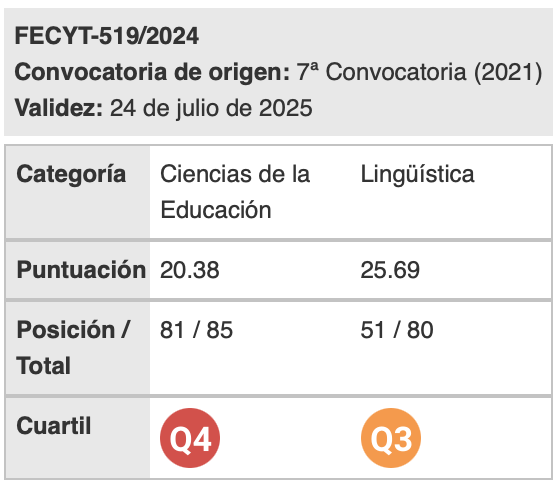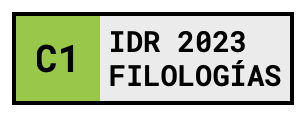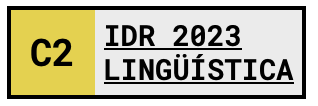Communication skills and ESP courses: a Basque experience
Palabras clave:
ESP, engineering, communication skills, role-play, interdisciplinary collaborationResumen
This paper analyzes those communication skills expected of engineers, as well as their current deficiencies. Subsequently, resources required to develop technical and professional communication maturity used in English for Specific Purposes (ESP) courses are specified. In particular, oral presentations and report writing, by means of role-play and simulations, are analyzed. Also considered are other aspects directly related to the improvement of communication skills, such as metacognition and interdisciplinary collaboration (communication). Finally, a practical case is presented: an ESP course for engineers at the Industrial Technical Engineering College from Bilbao (Spain). Several examples of tasks and activities to develop such skills are presented. Moreover, studies and data regarding their opinions about the importance of all these topics in their current learning process and in the long term are presented and analyzed. The main conclusions of the study could be summarized as follows: 1. Oral presentations and report writing are highly useful to improve engineering students’ communication skills; 2. The information provided to them can be successfully applied outside academia.
Descargas
Citas
Benson, P. (2001). Teaching and researching autonomy in language learning. London:
Longman.
Benson, P. (2003). Learner autonomy in the classroom. In D. Nunan (Ed.),
Practical English language teaching (pp. 289-308). New York, NY: McGraw Hill. C. J. Brumfit & Johnson, K. (Eds.) (1989). The communicative approach to language
teaching. Oxford: Oxford University Press.
Burns, A. C., & Gentry, J. W. (1998). Motivating students to engage in experiential
learning: a tension-to-learn theory. Simulation and Gaming, 29, 133-151.
Castro, J., Ibañez, C. & González, J. M. (1991). Interdisciplinary collaboration. The ideal way out in LSP teaching: the fruits of the Bilbao experience. In M. McGinity, R. Alejo & S. Gómez (Eds.), Lenguas aplicadas a las ciencias y a la tecnología (pp. 38-43). Badajoz: Universidad de Extremadura y Universidade de Evora.
Coll, C. (2003). El currículo universitario en el siglo XXI. In C. Moreneo & J. L. Poso (Eds.), La universidad ante la nueva cultura educativa. Enseñar y aprender para la autonomía (pp. 271-284). Madrid: Síntesis.
Dam, L. (1995). Learner autonomy 3; from theory to classroom practice. Dublin: Authentik.
Davies, J. (2001). Communication skills: A guide for engineering and applied science students. Essex: Pearson (Prentice Hall).
Elbow, P. (1998). Writing with power: Techniques for mastering the writing process. Oxford: Oxford University Press.
Epstein, M. (1999). Teaching field-specific writing: Results of a WAC survey. Business Communication Quarterly, 62(1), 29-41.
Esposito, E. & Sigler, E. (2001). Acquiring the tools to become a successful engineer in the 21st century: Aptitudes and attitudes. In D. Weichert, B. Rauhut & R. Schmidt (Eds.), Educating the engineer for the 21st century (pp. 221- 228). The Nederlands: Kluwer Academic Publishers.
Gardner, H. (1999). Intelligence reframed; multiple intelligences for the 21st century. New York, NY: Basic Books.
González Ardeo, J. M. (2002). Project Work interdisciplinar en un curso de ESP. XI Conferencia Internacional Lingüístico Literaria (pp. 195-203). Santiago de Cuba (Cuba): Universidad de Oriente.
Goñi, J. M. (2005). El espacio europeo de educación superior, un reto para la universidad. Barcelona: Octaedro/ICE-UB.
Grünwald, N. & Krause, R. (2007). The role of the European Union in fostering entrepreneurship education. Proceedings 10th UICEE Annual Conference on Engineering Education (pp. 53-58). Bangkok (Thailand).
Hill, M. & Storey, A. (2003). SpeakEasy: online support for oral presentation skills. ELT Journal, 57(4), 370-376.
Hutchinson, T. & Sawyer-Laucanno, C. (1990). Science and technology: specific purpose language training. In D. Crookall & R. L. Oxford (Eds.), Simulation, gaming, and language learning (pp. 135-141). New York, NY: Newbury House.
Keane, A. & Gibson, I. S. (1999). Communication trends in engineering firms: implications for undergraduate engineering courses. International Journal of Engineering Education, 15(2), 115-121.
Littlewood, W. (1992). Teaching oral communication: A methodological framework. Oxford: Blackwell.
Kmiec, D. M. (2004). Teaching engineering communication: a novel vertically- integrated and discipline-conscious curriculum. http://www.stc.org/ ConfProceed/2004/PDFs/0039.pdf.
Maier, H. R. (2007). Meeting the challenges of engineering education via online roleplay simulations. Australasian Journal of Engineering Education, 13(1), 31-39.
Monge Benito, S. (2008). La escuela vasca ante el cambio tecnológico (1999-2004). Tecnologías de la información y la comunicación en la enseñanza. Leioa, Bizkaia: Servicio Editorial UPV-EHU.
Mora Ruiz, J. G. (2003). Competencias y empleo de los jóvenes graduados universitarios. Revista de Educación, 330, 157-170.
Prince, R. (2006). Teaching engineering ethics using role-playing in a culturally diverse student group. Science and Engineering Ethics, 12(2), 321-326.
Ravensteijn, W., Graaff, E. & Kroesen, O. (2006). Engineering the future: the social necessity of communicative engineers. European Journal of Engineerng Education, 31, 63-71.
Riemer, M. J. (2007). Communication skills for the 21st century engineer. Global Journal of Engineering Education, 11(1), 89-101.
Sageev, P. & Romanowski, C. J. (2001). A message from recent engineering graduates in the workplace: results of a survey on technical communication skills. Journal of Engineering Education, 90(4), 685-92.
Sweeney, S. (1997). English for Business Communication. Cambridge: Cambridge University Press.
Tedford, J. D., Seidel, R. H. A. & Islam, M. A. (2007). Teamwork and its influence on learning in industry-based projects. Proceedings 10th UICEE Annual Conference on Engineering Education (pp. 203-206). Bangkok (Thailand).
Trebbi, T. (2003). Curriculum development and learner autonomy in the foreign language classroom: constraints and possibilities. In D. Little, J. Ridley & E. Ushioda (Eds.), Learner autonomy in the foreign language classroom: Teacher, learner and assessment (pp. 61-78). Dublin: Authentik.
van Esch, K. & St.John, O. (2003). A framework for freedom: Learner autonomy in foreign language teacher education. Frankfurt: Peter Lang.
Wilder, C. & Rotondo, J. (2002). Point, Click & Wow! A quick guide to brilliant laptop presentations. Hoboken, NJ: Jossey-Bass.
Descargas
Publicado
Cómo citar
Número
Sección
Licencia
Aquellos autores/as que tengan publicaciones con esta revista, aceptan los términos siguientes:
- Los autores/as conservarán sus derechos de autor y garantizarán a la revista el derecho de primera publicación de su obra, el cuál estará simultáneamente sujeto a la Licencia de reconocimiento de Creative Commons que permite a terceros compartir la obra siempre que se indique su autor y su primera publicación esta revista.
- Los autores/as podrán adoptar otros acuerdos de licencia no exclusiva de distribución de la versión de la obra publicada (p. ej.: depositarla en un archivo telemático institucional o publicarla en un volumen monográfico) siempre que se indique la publicación inicial en esta revista.
- Se permite y recomienda a los autores/as difundir su obra a través de Internet (p. ej.: en archivos telemáticos institucionales o en su página web) antes y durante el proceso de envío, lo cual puede producir intercambios interesantes y aumentar las citas de la obra publicada. (Véase El efecto del acceso abierto).

Revista de Lenguas para fines específicos is licensed under a Creative Commons Reconocimiento-NoComercial-SinObraDerivada 4.0 Internacional License.






















